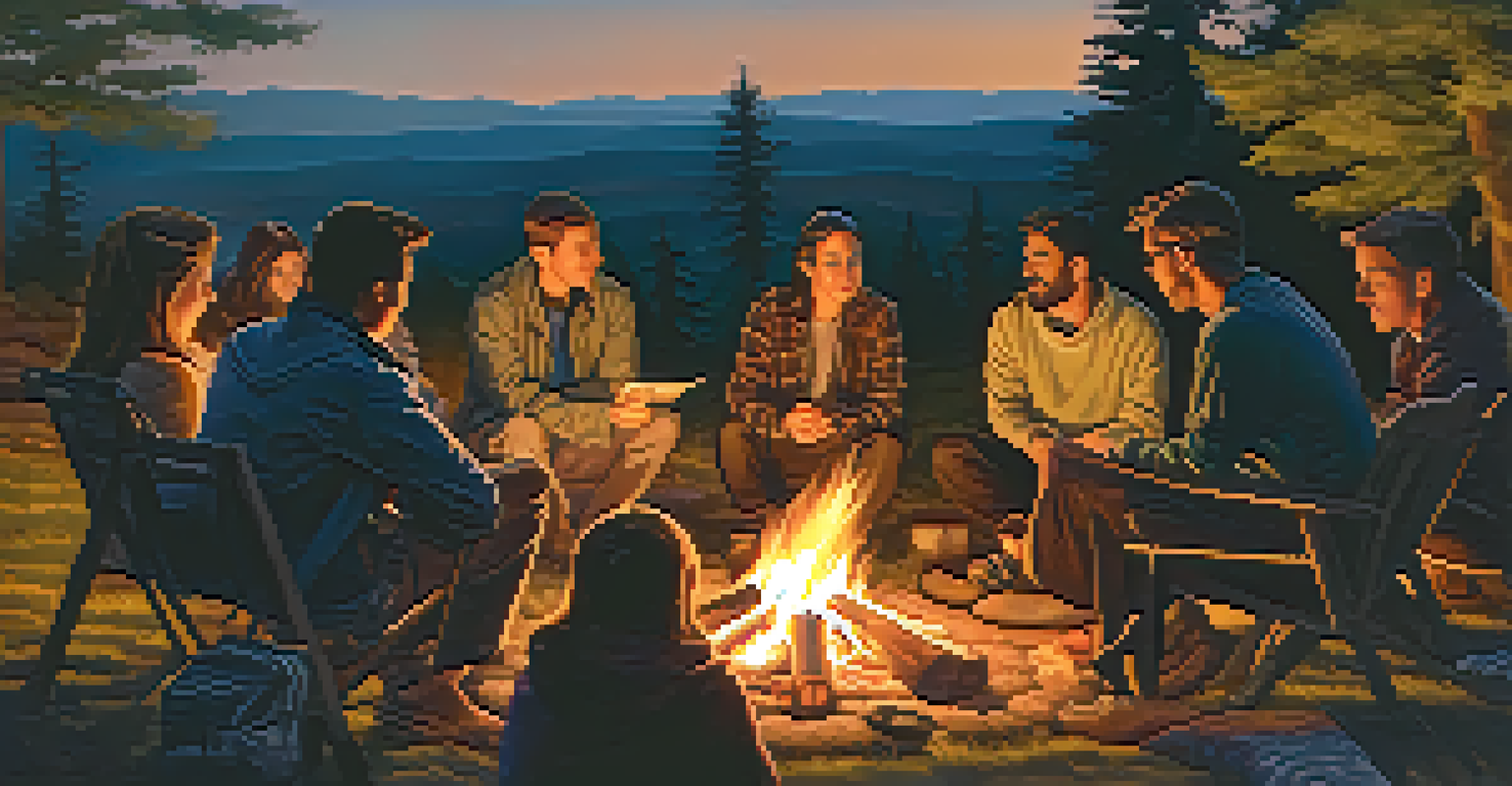Creating Safe Spaces: Community Guidelines for Psychedelic Use

Understanding the Importance of Safe Spaces
Creating safe spaces is crucial for anyone engaging in psychedelic experiences. These environments allow individuals to explore their consciousness without fear or judgment, fostering personal and collective growth. Just like a cozy blanket fort from childhood, these spaces provide comfort and security, encouraging openness and vulnerability.
The mind is everything. What you think, you become.
When people feel safe, they are more likely to share their thoughts and feelings, which can lead to profound insights. Imagine a warm campfire where stories are shared; that same sense of camaraderie should be present in psychedelic settings. It’s about building a community where everyone’s voice is valued and respected.
Moreover, a safe space helps to mitigate the risks associated with psychedelic use. By establishing guidelines, we create a foundation that prioritizes mental and emotional well-being, allowing participants to navigate their experiences with confidence.
Establishing Clear Communication Rules
Effective communication is the backbone of any safe space. Participants should feel empowered to express their thoughts, feelings, and concerns openly, without the fear of being dismissed or ridiculed. Think of it as a group project where everyone’s input is vital for success; each voice contributes to a richer experience.

Establishing ground rules about how to communicate can significantly enhance the experience. For example, encouraging active listening—where one person speaks while others listen attentively—can create an atmosphere of respect and understanding. This practice not only deepens connections but also fosters empathy among participants.
Create Safe Spaces for Growth
Safe spaces enable individuals to explore their consciousness without fear, promoting personal and collective development.
Additionally, having a designated facilitator can help guide discussions and ensure that everyone feels heard. This role is similar to that of a referee in a game, maintaining order and fairness while allowing the players to express themselves freely.
Creating a Respectful Environment
Respect is a fundamental element in any community, especially when discussing sensitive topics like psychedelics. Each participant comes with their own background, beliefs, and experiences, which should be honored. Imagine a potluck dinner where everyone brings something unique; it’s the diversity that makes the gathering special.
We do not learn from experience... we learn from reflecting on experience.
Encouraging open-mindedness can also help cultivate a respectful environment. Remind participants that differing opinions can lead to richer conversations and deeper understanding. This approach is akin to exploring a new city; the more perspectives you embrace, the more you discover.
Moreover, establishing boundaries is essential for maintaining respect. Participants should feel comfortable setting limits on what they are willing to share or discuss, ensuring everyone respects those boundaries like they would a personal space bubble.
Prioritizing Mental and Emotional Health
Mental and emotional health should always be a priority within psychedelic communities. This means being aware of the potential challenges that can arise during these experiences. Just as a lifeguard keeps an eye on swimmers, community members should look out for one another, offering support when needed.
Encouraging participants to check in with themselves and others can help maintain a supportive atmosphere. Simple practices like asking, 'How are you feeling right now?' can foster connections and ensure everyone is comfortable. It’s like keeping a garden healthy; regular care and attention make a significant difference.
Establish Clear Communication Rules
Effective communication fosters a respectful environment where all participants feel valued and heard during discussions.
Furthermore, providing resources for mental health support can be invaluable. Whether it’s sharing contact information for therapists or offering workshops on coping strategies, these resources empower individuals to take charge of their well-being.
Setting Guidelines for Substance Use
When engaging in psychedelic experiences, it’s essential to set clear guidelines around substance use. This includes discussing dosage, preferred substances, and individual experiences. Think of it as preparing for a road trip; you wouldn’t want to hit the road without a map or a plan.
Encouraging participants to share their experiences with different substances can help everyone make informed choices. Creating a culture of transparency promotes safety and trust, allowing individuals to navigate their journeys with a sense of community support. It's like having a trusted friend guide you through a maze.
Additionally, reminding individuals to prioritize their health and well-being can help mitigate risks. This includes being aware of potential interactions with medications, personal health conditions, and the importance of a supportive environment.
Emphasizing Aftercare Practices
Aftercare is a crucial yet often overlooked aspect of psychedelic use. Just as you would cool down after an intense workout, participants should have a plan for processing their experiences afterward. This could involve sharing insights, journaling, or simply taking time to reflect in a quiet space.
Encouraging participants to connect with one another after the experience can foster a sense of community. This post-experience discussion can provide closure and help individuals integrate their insights into their daily lives, much like debriefing after a team project to understand what worked and what didn’t.
Prioritize Aftercare and Support
Aftercare practices are vital for processing experiences and ensuring participants feel supported in their ongoing journeys.
Moreover, providing resources for ongoing support can further enhance aftercare practices. Participants should feel empowered to reach out for help or guidance as they continue their journeys, ensuring they know they are not alone.
Encouraging Continuous Learning and Growth
Creating a culture of continuous learning is essential in any community focused on psychedelics. As knowledge about these substances evolves, so too should the community’s understanding and practices. Think of it as an evolving recipe; there’s always room for improvement and adaptation.
Encouraging participants to share articles, books, and personal experiences can foster a rich learning environment. This collaborative approach not only empowers individuals but also strengthens the community as a whole, much like a book club where members inspire each other.

Moreover, hosting workshops or discussion groups can provide structured opportunities for learning and growth. These gatherings can serve as a platform for exploring new ideas and perspectives, helping everyone stay informed and engaged.